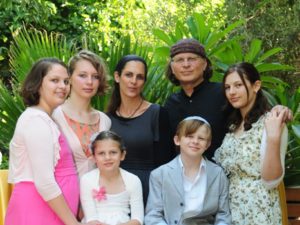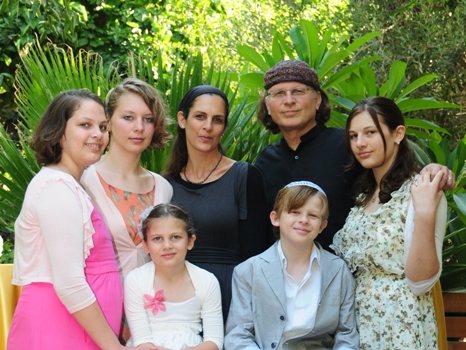Living in Israel
 Three-time Emmy award winner Simcha Jacobovici is anything but the typical Oleh (new immigrant). The much-lauded documentary filmmaker, who brought the tools of investigative journalism into biblical archeology, is known for producing groundbreaking documentaries such as The Exodus Decoded and The Lost Tomb of Jesus. While the accomplished director and producer saw making Aliyah from Toronto, Canada as part of the natural progression of his life, others found Jacobovici’s fascinating odyssey and the ease with which he, his wife Nicole, and their five children made their new life in Israel – as nothing short of inspiring.
Three-time Emmy award winner Simcha Jacobovici is anything but the typical Oleh (new immigrant). The much-lauded documentary filmmaker, who brought the tools of investigative journalism into biblical archeology, is known for producing groundbreaking documentaries such as The Exodus Decoded and The Lost Tomb of Jesus. While the accomplished director and producer saw making Aliyah from Toronto, Canada as part of the natural progression of his life, others found Jacobovici’s fascinating odyssey and the ease with which he, his wife Nicole, and their five children made their new life in Israel – as nothing short of inspiring.
Jacobovici was born in Israel, but his family left for Montreal when he was nine years old. The journey back began twenty years ago, in Toronto, when Aliyah was a dream for newlyweds Simcha and Nicole. As the young couple moved toward modern orthodoxy, their growing commitment to Judaism brought their Aliyah dream into focus. “We wanted to be a part of the miracle of the ingathering of the exiles, not watch from the sidelines,” explains Jacobovici. Sixteen years later they came to Israel to live, and two years later, in the summer of 2009, they made it official when they made Aliyah with Nefesh B’Nefesh. They finally felt they were where they belonged.
Simcha has a very practical perspective on Aliyah. He points out that Israel is very real. Ideology can get you to Israel, but you must be realistic and practical in order to succeed, both personally and professionally. “There was no red carpet,” Jacobovici recalls when discussing his professional life here in Israel. “The documentary community did not immediately embrace me. I had to make my place here.” Anyone who reads the news or watches TV knows that Jacobovici did more than just “make his place here.” Since moving to Israel, Jacobovici has been involved in a number of high-profile and sometimes controversial productions, including the popular documentary series ‘The Naked Archaeologist’ which, he produces and co-hosts with popular Israeli TV host Avri Gilad. The program is featured internationally on Canada’s Vision TV channel, the History Channel and aired in Israel as well. It reviews Biblical stories while exploring Israel to find proof. “Suddenly people in Israel are coming up to me all the time, talking to me, arguing with me, or just giving me a high five. It’s very gratifying.” He was also involved in the production of a documentary shown on the National Geographic Channel called ‘Finding Atlantis’.
On a personal level, Jacobovici is extremely content with his life in Israel. “It feels like home. We love our life here,” Jacobovici says. “When you’re on vacation in Israel you don’t fully understand the fabric of society. But it’s like family. You don’t feel it until you live here. It expresses itself in millions of different ways. Like the grocer asking “how your kids are adjusting to school or the proprietor in a hole-in-the-wall shop in Kfar Saba “who turned out to actually be a relative”.
Jacobovici tells of his creative and positive way of understanding and dealing with moments related to being a new immigrant. “People take things for granted. You have the shampoo that you like, you automatically go to the bank when it’s open, you don’t even have to think about mundane things. When you move to a new place with a different culture the automatic stuff isn’t automatic. You go to the bank and it’s closed; next time you think you got it right – it’s a holiday and it’s still closed. It’s like you’re out of sync with society. But then I remember one day, I had a revelation: I no longer compared. I don’t care when banks are open in Canada. It was all good the way it was here.”
Jacobovici’s family seems to see their life in Israel similarly. He proudly declares that his oldest daughter will be going into the army in April, while his three other daughters and his son are happily adjusted to their lives and friends in Israel. “They all wanted to be here,” Jacobovici points out. “It was part of the culture of the house. The kids picked up Hebrew and they feel they belong.” When reflecting on the success of their Aliyah, Jacobovici right away credits his wife, Nicole. “She’s the one who is really building the home in Israel,” he says. “Of course it has to be a partnership, but she’s the one who went to ulpan, the one who had to change her day-to-day life. She’s the center for the children and the family.” As Jacobovici puts it, while his life professionally hasn’t changed much since he maintains a base of operations in Canada and must travel a lot for his work, for Nicole everything changed. She had to learn the language, face the teachers, help the kids with homework, manage the various after-school activities, and so forth. She does it all with grace, topping it off with going to study groups and volunteering in her community.
“My wife fell right into this,” Jacobovici adds. “Nicole is the heroine who made it all possible. When I walk down the street in my own neighborhood, people say, ‘you lucky guy.’”
Written by Laura Ben-David

